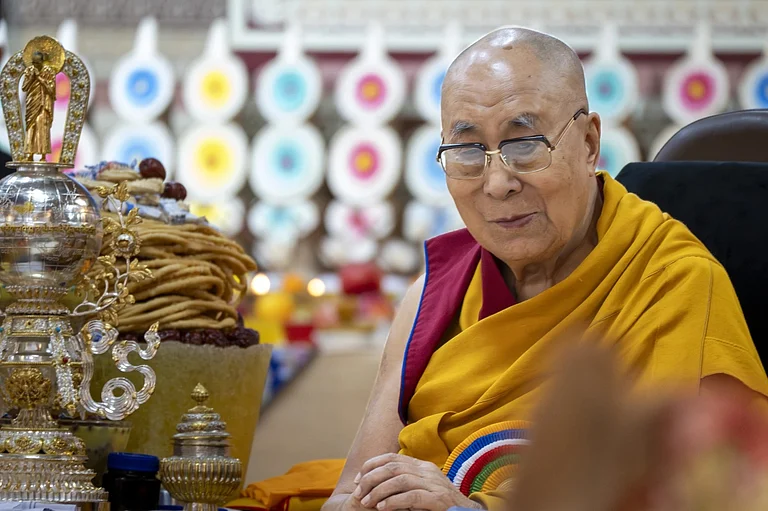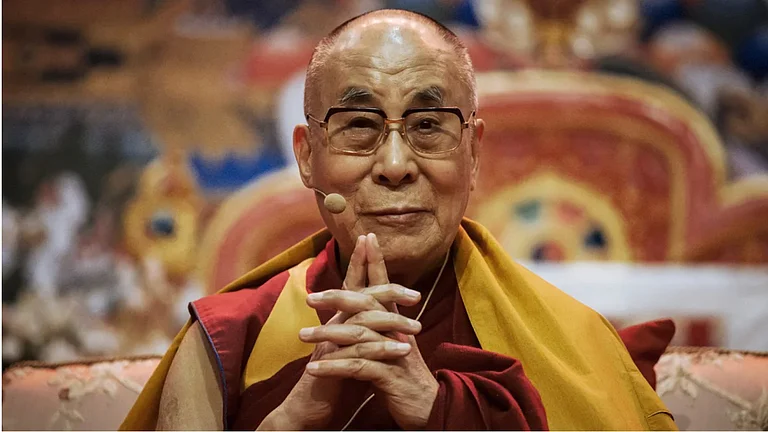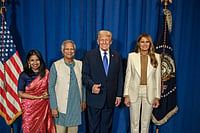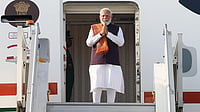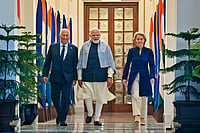The visit of a US Congressional delegation to Dharamshala, to meet with Tibet’s spiritual leader Dalai Lama against the background of testy US-China relations has naturally provoked an angry reaction from Beijing. It is normal for China to thrash the US and Western politicians whenever they meet the Tibetan leader whom Beijing considers a traitor and a "splittist’’. What is more, it has come at a time when The Resolve Tibet Act had passed through the US Congress and is awaiting President Joe Biden’s signature. The President will sign it soon.
The delegation is led by House Foreign Affairs Committee Chairman Michael McCaul. It includes Nancy Pelosi, who had retired from Congress but is Speaker Emerita, Mariannette Miller, Gregory Meeks, Nicole Malliotakis, Jim McGovern, and Ami Bera. It is a bipartisan delegation with both the Democrats and Republicans on the same page on China.
The Resolve Tibet Act reiterates the US position that the Tibetans are people with a distinct religious, cultural, linguistic, and historical identity. Further, that the dispute between Tibet and China must be resolved in accordance with international law including the UN Charter by peaceful means and through dialogue. The Act also urges China to uphold all its commitments under the International Covenant on Economic, Social, and Cultural Rights. China has for long cracked down on Tibetan followers of the Dalai Lama. The act mentions that the current Chinese policies are systematically suppressing the ability of Tibetans to preserve their religion, culture, language, and their way of life.
But the cherry on the cake for the Tibetans is that the Act also says that China’s claims that Tibet has been part of the mainland since historical times are inaccurate. Further that the US through its public diplomacy would counter disinformation about Tibet spread by the propaganda machine of the Communist Party and its claims about Tibetan history.
Felicitating the Congressional delegation this morning, the Sikyong, Penpa Tsering of the Central Tibetan Administration noted: "We have gathered here to thank the delegates for their tenacity and commitment to move the Resolve Tibet Act in the US Congress…The Resolve Tibet Act is very important to us and you have taken a lot of energy to get this through the House and the Senate…,’’ the Tibetan press team posted on X.
China is naturally angry and foreign ministry spokesperson Lin Jian said at the weekly briefing in Beijing: “We are gravely concerned over the relevant reports and urge the US side to fully recognise the anti-China separatist nature of the Dalai group, honour the commitments the US has made to China on issues related to Xizang, have no contact with the Dalai group in any form, and stop sending the wrong signal to the world." China officially refers to Tibet as Xizang. He further added, “The 14th Dalai Lama is not a pure religious figure, but a political exile engaged in anti-China separatist activities under the cloak of religion.”
Former Speaker of the House of Representatives, Nancy Pelosi, is a passionate advocate of the Tibetan cause. She was in Dharamshala at the time of the Chinese crackdown in Tibet ahead of the Olympics of 2008. Many young monks protested by setting themselves on fire. Pelosi, then the House Speaker, had come to express her solidarity with Dalai Lama and his people. In 2022, she further provoked China by visiting Taiwan. Beijing was rattled and the foreign ministry issued this strong statement: "On 2 August, in disregard of China's strong opposition and serious representations, Speaker of the U.S. House of Representatives Nancy Pelosi visited China's Taiwan region. This is a serious violation of the one-China principle and the provisions of the three China-U.S. joint communiqués. It has a severe impact on the political foundation of China-U.S. relations, and seriously infringes upon China's sovereignty and territorial integrity. It gravely undermines peace and stability across the Taiwan Strait, and sends a seriously wrong signal to the separatist forces for "Taiwan independence"".
In a polarised America, the two major political parties rarely see eye to eye. But there is a rare unanimity on China and India. Ironically it was the US under Republican President Richard Nixon and Secretary of State Henry Kissinger who befriended China with a breakthrough presidential visit in 1972. That set the pace for rapid development of China with the help of US business and technology. Kissinger’s attempt was to weaken the Soviet Union and the Communist movement. That was during the Cold War era. Since then there has been no looking back and US-China relations flourished.
In fact, it was former Republican President Donald Trump, who took on Beijing by highlighting Chinese unfair trade practices and slapped several sanctions on Chinese companies. President Biden has followed this up with further sanctions as both parties now agreed that China’s rapid growth would eventually lead to Beijing challenging Washington’s global position.
China’s increasingly aggressive moves in the South China Sea, its saber-rattling against Taiwan, and its behaviour with countries like Vietnam, the Philippines, and Japan have led to a hardening of attitude. The quad or quadrilateral grouping of the US, India, Australia, and Japan was formed to counter and contain China in the larger Indo-Pacific and Indian Ocean waters.
Washington’s growing strategic co-operation with India is partly because the US wants India to challenge China’s rise in Asia. It suits India well, considering the downswing in India-China ties. Both India and the US adhere to the one-China policy.








